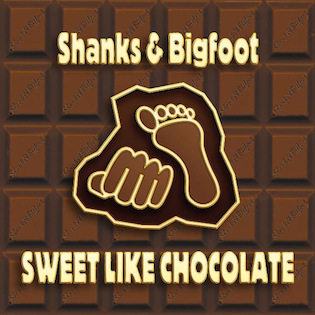
"Sweet like Chocolate" is a song by British garage music duo Shanks & Bigfoot with vocalist Sharon Woolf. It was released as a single on 17 May 1999 and was included on the duo's debut album, Swings and Roundabouts, the following year. Vocals on the track are sung by Sharon Woolf, who had also sung on their track "Straight from the Heart", which was released under their previous band name, 'Doolally'.

"Stomp" is a song by British pop group Steps, released as a single on 16 October 2000. The song features an orchestral riff from "Everybody Dance", released by Chic in 1978. "Stomp" was the group's second and final single to hit number one on the UK Singles Chart. The track was later released in Australia, Japan, and Europe.

"One for Sorrow" is a song by British pop-dance group Steps, released as the third single from their debut album, Step One (1998). It also became the quintet's first single to reach the top five on the UK Singles Chart. Debuting at number two and spending 11 weeks on the UK chart, the song established Steps's intention to revive the ABBA sound, striking a considerable resemblance to their 1980 hit "The Winner Takes It All". A remixed version became their debut US single in 1999 and was featured on the Drive Me Crazy film soundtrack. It became Steps' only single to appear on any US Billboard chart, peaking at number 38 on the Hot Dance Club Play chart in October 1999.

"Better Best Forgotten" is a song by British pop group Steps, released on 8 March 1999. It was the final single to be taken from their debut album, Step One. The song became the group's fourth top-10 hit in the UK, peaking at number two on the UK Singles Chart, and it also reached the top 20 in Ireland and the Flanders region of Belgium.
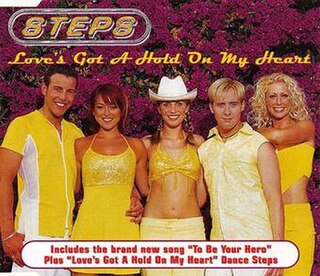
"Love's Got a Hold on My Heart" is a song by British pop music group Steps. It was released as the lead single from the band's second album, Steptacular (1999). The song features Faye Tozer and Claire Richards on lead vocals. The single peaked at number two in the United Kingdom and became a top-20 hit in Finland, Flanders, Ireland, and New Zealand.
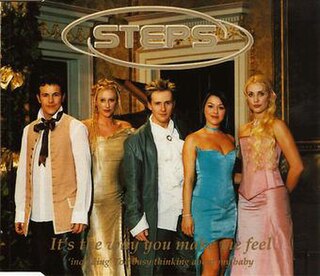
"It's the Way You Make Me Feel" is a song by British dance-pop group Steps, released as their 12th single on 1 January 2001. It is the second track to be released from their third album, Buzz, and peaked at number two on the UK Singles Chart. This was the first song the band performed following their official reformation in October 2011. The single's B-side, a cover of Marvin Gaye's "Too Busy Thinking About My Baby", was taken from the Motown Mania compilation.

"Chain Reaction" is a song by American singer Diana Ross, released on November 12, 1985, as the second single from her sixteenth studio album, Eaten Alive (1985). The song was written by the Bee Gees and contains additional vocals from Barry Gibb. Sonically, "Chain Reaction" is an R&B and dance-pop song. According to the Gibbs' biography, the brothers had initial reservations about offering the song to Ross in case it was too Motown-like for her. The single became Ross's second No. 1 hit in the UK Singles Chart. It also hit No. 1 in Australia, Ireland, and Zimbabwe. In New Zealand, it peaked at No. 3 and it made the top 5 in South Africa. In 1993, the song broke the UK top 20 again when it was re-released to commemorate her 30th anniversary in show business. The song fared poorly in the US, where it initially peaked at a disappointing No. 95 on the Billboard Hot 100 late in 1985. A few months later, a remixed version of the song was issued as a single. The new version re-entered the chart and performed better, but with diminished momentum, it stalled at No. 66 on the Billboard Hot 100 and No. 77 on the Cash Box Top 100.
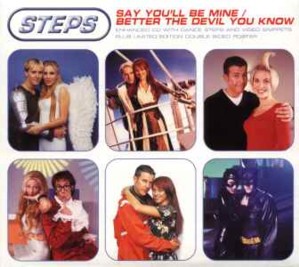
"Say You'll Be Mine" is a song by British dance-pop group Steps, released as a double A-side with a cover version of Kylie Minogue's "Better the Devil You Know". Steps' cover of "Better the Devil You Know" was later included as the opening track on their third studio album, Buzz (2000), but did not serve as a lead single. A limited-edition single was released as a digipack that was included with a doubled-sided poster in the sleeve. The song is the first to feature all five members on lead vocals.
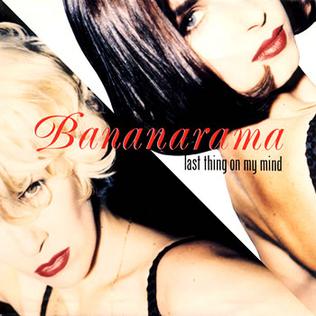
"Last Thing on My Mind" is by English girl group Bananarama from their sixth studio album, Please Yourself (1993). It was released on 16 November 1992 as the album's second single. The track was produced by Mike Stock and Pete Waterman, two-thirds of the Stock Aitken Waterman (SAW) trio. Waterman stated in 2002 the song was influenced by Mozart. The single peaked at number 72 on the UK Singles Chart. In 1998, British group Steps released a cover version of the song as a single, peaking at number six on the UK Singles Chart.

"All I Have to Give" is a song by American boy band Backstreet Boys, produced and written by Full Force, and released as the third and final single from their second album Backstreet's Back and the sixth and final single from their US debut album. The single debuted at number two on the UK Singles Chart and peaked at number five on the US Billboard Hot 100, becoming their third top-10 single in the US, following "Everybody ".

"Deeper Shade of Blue" is a song by British dance-pop group Steps, released as the band's ninth single. It is an uptempo pop song about the darker side of life and an attempt to break free. It was the fifth song to be released from the group's second studio album, Steptacular (1999). The song was originally recorded by Tina Cousins, but, aside from a few promotional 12-inch records, her version remains unreleased. The song entered the UK Singles Chart at number four and spent one more week in the top 10 before falling down the charts. After a total of nine weeks, it left the top 100.
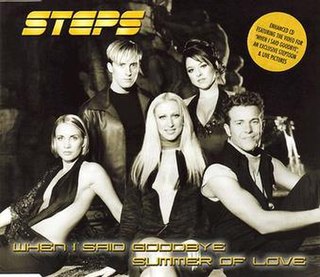
"When I Said Goodbye" / "Summer of Love" is a double A-side single released by British pop music group Steps. "When I Said Goodbye" is taken from their second studio album, Steptacular (1999), while "Summer of Love" was a previously unavailable track, later included on their third album, Buzz (2000). Following its release on 3 July 2000, the double A-side peaked at number five in the United Kingdom and number 18 in Ireland.
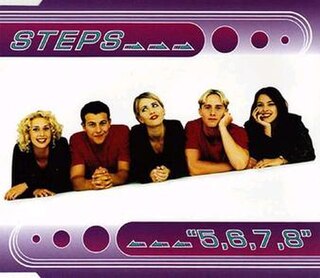
"5,6,7,8" is a song by British group Steps from their debut studio album, Step One (1998). It is a techno-pop and country pop song written Barry Upton and Steve Crosby, and produced by Karl Twigg, Mark Topham and Pete Waterman. It was released as their debut single in November 1997 following their being put together after each group member responded to a magazine advert looking for people to audition to be in a pop band.

"Here and Now" and "You'll Be Sorry" are two songs by British pop group Steps. Both tracks appear their third studio album, Buzz (2000). Released on 4 June 2001, the songs were the band's fourth double A-side single. In Europe, the song "Here and Now" was released alongside "Summer of Love" instead. The single reached number four in the United Kingdom and number 23 in Ireland.

"Thank ABBA for the Music" is a medley of songs originally released by pop group ABBA, performed by Steps, Tina Cousins, Cleopatra, B*Witched and Billie. The medley consists of "Take a Chance on Me", "Dancing Queen", "Mamma Mia", and "Thank You for the Music". It was originally performed during the 1999 Brit Awards, which occurred on 16 February, and its release coincided with the debut of the ABBA musical Mamma Mia!. The medley peaked at number four on the UK Singles Chart in April 1999 and reached the top 10 in Australia, Ireland, New Zealand, and Sweden.

"Words Are Not Enough" / "I Know Him So Well" is the fifth double A-side single released by British dance-pop musical group Steps. "Words Are Not Enough" is a new composition while "I Know Him So Well" is a cover of the 1984 song by Elaine Paige and Barbara Dickson from the musical Chess (1986). Andreas Carlsson and Pelle Nylén wrote the former song while Björn Ulvaeus, Benny Andersson, and Tim Rice wrote the latter. "Words Are Not Enough" was taken from the group's first compilation album, Gold: Greatest Hits (2001), while "I Know Him So Well" appeared on the 1999 ABBAmania tribute album and later Steps' own The Last Dance collection (2002).

"We've Got It Goin' On" is the debut single of American boy band Backstreet Boys. It was released on September 11, 1995, as the lead single from their self-titled debut album. The song was recorded at Cheiron Studios in Sweden during a week in June 1995. It was written and produced by Max Martin and his then-mentor Denniz Pop, with extra writing from Herbert Crichlow and was later included in the US album and achieved success worldwide. The single peaked at number 69 on the Billboard Hot 100 and spent 20 weeks on the chart. It was released across Europe, where it reached the top five in several countries, including Austria, Belgium, France, Germany, the Netherlands, Switzerland and the United Kingdom. On the Eurochart Hot 100, the song reached number five.
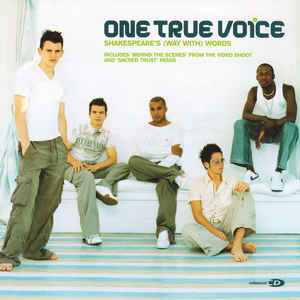
"Shakespeare's Words" is a song by Popstars: The Rivals male winners One True Voice, released on 2 June 2003. The song was the second and final release by the band, as they split up in August 2003 without having released an album. The song reached number 10 on the UK Singles Chart and number 39 in Ireland.

"After the Love Has Gone" is a song by Steps, released as their seventh single, and the third from their second album Steptacular. The track continues the group's pop sound but has clear Asian musical influences. Claire Richards provides lead vocals.



















